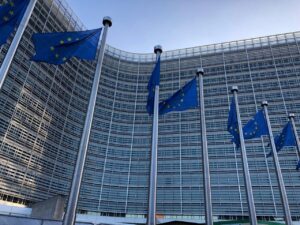Within a few days the Polish government will present legal arguments on the Nord Steam 2 project. They will confirm that the Third Energy Package has to be applied to the project – Michał Kurtyka Energy Vice Minister told the Polish Press Agency (PAP).
„We will present an analysis that will confirm the necessity to create as strong a legal regime for Nord Stream 2 as possible. It will also attest to the fact that the Third Energy Package should be applied to this gas pipeline and in general to all gas pipelines running on the Baltic seabed,” Kurtyka said.
He also added that according to the Polish government the legal regime for Nord Stream 2 should be established as soon as possible. „We believe that a negotiation mandate for the Commission does not have to be part of this,” he said. „Alternatively the Gas Directive could be amended to plainly state that it should be applied to gas pipelines importing fuel from third countries,” he pointed. In his opinion such a proposition would have to be processed urgently. „It seems there should be a consensus regarding this necessity,” he added.
The Polish analysis is to be presented on 12 October during a meeting of the EU Council’s Working Party on Energy, which, according to Kurtyka, will be a starting point for further discussions. The Deputy Minister reminded that during the debate at the European Parliament on 14 September all large political groups opposed Nord Stream 2. „It seems the EC, which is attuned to the voice of the EP, cannot ignore such a clear political statement,” he assessed. Kurtyka also pointed out the fact that already in 2009 all Member States agreed that large infrastructural projects should be subject to common rules and that the overarching goal was to diversify supply sources.
„Completing Nord Stream 2 would send a bad signal to the European solidarity and unity as well as Ukraine. A lot of Member States have already said they were against the project. They understand not only its negative impact on Central and Eastern Europe, but also on the cohesion of the European gas market, which, in theory, was supposed to be based on the competition between regional gas hubs. Concentrating gas deliveries in one route that goes across Germany will halt this process, and will have an adverse effect on the possibilities of opening the European market to alternative supply sources and on the potential profitability of imports from other regions of the world,” Michał Kurtyka said.
This is why the Polish government believes there exists a large number of political reasons to stop the works and investment decisions until all doubts are dispelled.
A few days ago the media revealed the opinion of the EU Council’s Legal Service, which proves that the most legitimate legal regime for Nord Stream 2 that regulates the status and offshore infrastructure operation rules are the regulations of the international sea law. According to the Polish government – as Kurtyka said – the analysis is „quite controversial and goes against the EP’s and EC’s as well as at least half of the Member States’ assessment of the project’s negative impact on the EU gas supply security.”
„Recognized authors have written analyses that support a position similar to ours, for instance Hungary’s REKK or Brussels’ Bruegel,” he said. Kurtyka also reminded about an analysis prepared by the European Political Strategy Centre, EC’s in-house think tank, on Nord Stream 2, which said that the project introduced divisions in the Union and should not be pursued at all.
Ihor Nasalyk, Ukraine’s Minister for Energy and Mining Industry, is also of the opinion that Nord Stream 2 is not necessary to efficiently transmit Russian gas to the EU. In an interview for PAP, Nasalyk reminded a recent situation where the existing Nord Stream was being renovated, which made Gazprom increase transmission via Ukraine.
„The contract did not provide for an increase in transmission, but that was not a problem. Ukraine met Gazprom’s orders and increased the transit,” Nasalyk said. „This way we showed we are a good and reliable transmission route for sending sufficient gas amounts to Europe,” he added. He pointed that the situation also proved that the Turkish Stream pipeline was superfluous as well.








